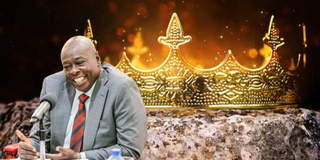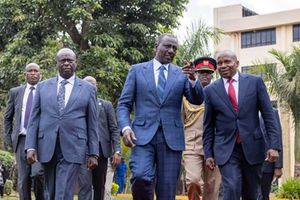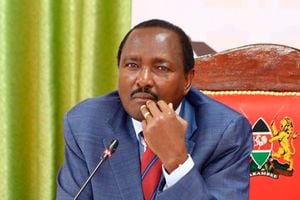
Deputy President Rigathi Gachagua's powers are limited, and he faces criticism for focusing too heavily on regional issues rather than national unity.
In the shadow of Mount Kenya, a political drama unfolds and it revolves around one man.
Deputy President Rigathi Gachagua, whose political raison d'être for the last two years has been to rise as the region’s undisputed kingpin, now finds himself trapped in a role critics consider more pageantry than powerful.
There have been two press conferences this week alone, all intended to downplay his place in the restless region’s politics.
Whereas one meeting was to appoint a spokesperson for Mount Kenya East — what observers consider an attempt to split the mountain — the next was to declare that there was only one way to reach the “father” President William Ruto: through Interior Cabinet Secretary Kithure Kindiki, the man who missed Mr Gachagua’s current position by a whisker in 2022.
Almost all allies of the President, especially from Mt Kenya region, preferred Prof Kindiki as Dr Ruto’s running mate in the run-up to the last General Election but the calculating Mr Gachagua, who was then a one-term Mathira MP, manoeuvred his way to eventually become an unlikely deputy President.
“We, as the elected leaders from this region and its Diaspora on our own behalf and that of our people, unanimously resolve that our link to the national government be the Interior CS Kithure Kindiki, whose responsibilities include the coordination of national government functions across the country,” at least 48 MPs from the mountain said Thursday, in what has been christened the Nyahururu declaration.
But as he struggles to assert his influence, Kenya watches a man wrestling with the limitations of his office and the weight of regional expectations even as his allies put on a brave face.
Gatanga MP Edward Muriu emphasised that Mt Kenya’s political landscape is driven by the concerns and needs of its people rather than loyalty to individual leaders.
“Even in the last election, the people of Mt Kenya defied former President Uhuru Kenyatta with the ODM brigade yet Azimio which he led was the biggest coalition. Theirs is a zero-sum game as they are making the same fundamental mistake of not listening to the people,” Mr Muriu told Nation Africa on Thursday.
When William Ruto tapped Gachagua as his running mate in 2022, it seemed like a masterstroke. Mr Gachagua, a stalwart from the vote-rich Mount Kenya was poised to be a kingmaker. But two years into his tenure, the Deputy President is learning a harsh lesson in political reality: sometimes, the crown comes without the kingdom.
Gachagua's position is unprecedented in Kenyan politics.
Unlike his boss William Ruto who was a coalition partner when URP joined Mr Uhuru Kenyatta’s TNA for the 2013 Jubilee ticket and subsequently formed the Jubilee party together ahead of the 2017 elections, Mr Gachagua’s political clout in the ruling UDA remains precarious — and so is the extent of his powers as a Deputy President.
Even though more insulated from being sacked on a whim like Kenya’s vice presidents of old, some still see his role as akin to an American Vice President: all ribbon-cutting, with limited decision-making powers.
This American-style model has left Gachagua in a precarious position. He's technically the second-most powerful person in Kenya, but in practice, he's struggling to influence policy or even fully issue Executive directives without the President’s nod.
The Kenyan Constitution outlines the Deputy President's role as the principal assistant to the President, expected to perform functions assigned by the President and act in the Head of State’s absence.
However, these provisions highlight the supportive and subordinate nature of the role, contrasting sharply with the more autonomous positions seen in previous coalition governments.
Mr Gachagua has tried to carve out a niche for himself as the voice of the Mount Kenya region. His frequent speeches, press conferences and media interviews in vernacular stations have kept him in the spotlight, but they've also drawn criticism for behaving like the Deputy President of Mt Kenya. It is a barb Mr Gachagua has dismissed in his push to unite the region under his leadership.
He's undoubtedly walking a tightrope: on the one hand, he needs to advocate for his base while on the other, he's expected to be a national figure. It is not an enviable position.
This regional focus has put Mr Gachagua at odds with some of President Ruto's allies, who accuse him of undermining the national agenda.
More grating still for some of President Ruto’s allies is the Deputy President’s style of politics they consider unnecessarily antagonistic.
The tensions intensified during the Gen Z protests when Mr Gachagua held a parallel press conference in Mombasa after the President addressed the nation from State House, Nairobi. It was Mr Gachagua’s way of asserting his authority while at the same time endearing himself to the disgruntled young Kenyans but critics questioned the wisdom of the decision at such a critical national moment. It also exposed fractures within the government and highlighted the struggle to define the Deputy President’s role and conduct.
Mr Gachagua's predicament is further complicated by allegations of his involvement in funding anti-government protests. These accusations, which he vehemently denies, have led to investigations of his allies and heightened scrutiny. It's a classic case of being damned if you do and damned if you don't – assert yourself too much, and you're seen as a threat; remain submissive, and risk sliding into political oblivion.
Embakasi Central MP Benjamin Gathiru, popularly known as Major Donk, a Gachagua ally, warned his colleagues of political consequences over their stance. In this school of thought, the Deputy President has won the hearts and minds of the Mt Kenya people while his opponents are either in denial or unaware of the political shift.
He said the latest move is part of a renewed tactic to tame the DP, warning it would backfire.
“In the last election, all those who did not toe the line politically were voted out because they failed to listen to the electorate. Kindiki is a nominated CS, not elected like the DP. We will continue to speak the truth to the opponents of the DP and he remains the custodian of this government’s popularity in the Mt Kenya region,” the MP said.
The Deputy President's attempts to navigate these treacherous waters have led to some surprising moves. His recent outreach to former President Uhuru Kenyatta, a man he once criticised harshly and between whom there is no love lost with the current president, shows a willingness to build new alliances.
This political manoeuvring, including an emerging dalliance with Wiper Party leader Kalonzo Musyoka, indicates Mr Gachagua's adaptability and his recognition of the need to forge new partnerships to strengthen his position.
However, Mr Gachagua's journey over the past year has been marked by significant challenges. Early in his tenure, he voiced concerns about being undermined by President Ruto's advisors, publicly airing grievances that underscored the internal tensions within the administration.
Despite his efforts to establish himself as a regional kingpin, he has faced indifference from majority of legislators from his Mt Kenya region, a stumbling block in his quest for influence. The MPs accuse him of being condescending and aggressive in the manner he handles them.
The implications of Mr Gachagua's unique role are far-reaching. His limited autonomy in his official duties, derived primarily from his association with President Ruto, constrains his ability to act independently.
Then there is the tension between his regional advocacy and the expectations of a national leader creates friction not only within the government but also among the public.
Talks that he may choose to challenge his boss in the 2027 race to State House has only helped fuel the bad blood. As Mr Gachagua looks to the future, he faces challenges which he may turn to his advantage depending on how he navigates the political minefield.
Pundits like Tom Mboya from Maseno University hold that overcoming the perception of powerlessness is paramount.
“He needs to demonstrate tangible achievements and effective leadership to mitigate the view that his office lacks real influence. Navigating internal political dynamics and conflicts with Ruto's allies requires building trust and cooperation within the government – no small feat given the existing tensions” he said.
Mr Mboya traces DP’s tribulations to the manner he was picked as running mate.
“The idea of kingpin should be progressive, Mr Gachagua’s is not working because he was imposed instead of happening naturally. There was acrimony when he was picked — remember majority of William’s allies favoured Kindiki. This is what’s haunting him to date. He has a long way to go in earning the kingpin title: it may or may never come to fruition,” the political science lecturer said.
Analysts say he needs to find a way to be both a regional champion and a national leader while remaining in the president's good graces.
But his handlers say that since all politics is local, he's home and dry as long as he has the pulse of the mountain, which gives him enough leeway to negotiate with other national leaders whenever necessary.
This challenge is compounded by the need to build a support base that extends beyond his home region, a task that requires broadening his appeal and policy focus.
For now, Rigathi Gachagua remains a man caught between the mountain and a hard place.
His journey illustrates the complexities of Kenyan politics, the challenges of being deputy president and the delicate balance between regional interests and national unity.







